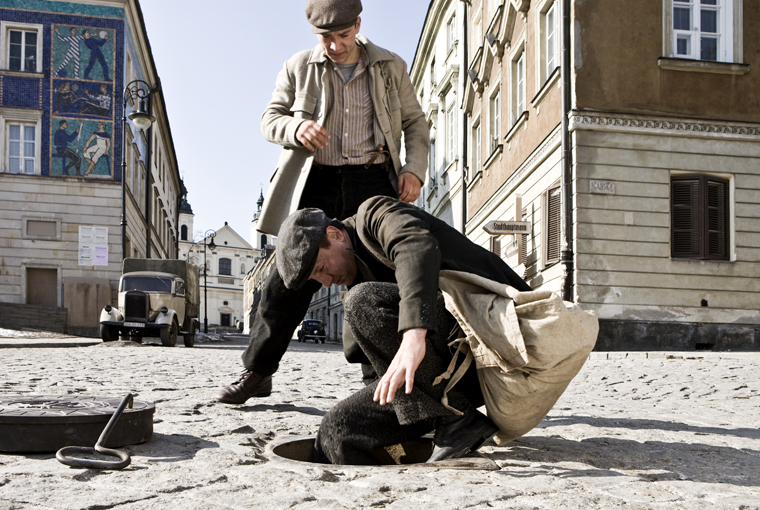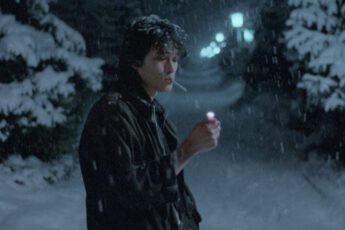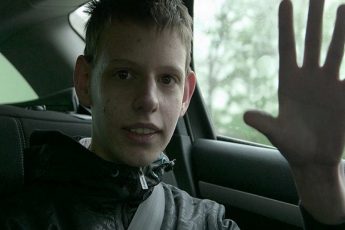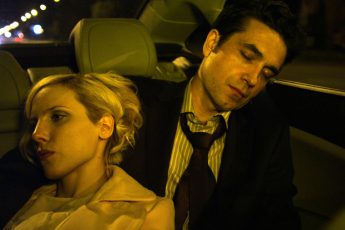Stalemate
Agnieszka Holland’s In Darkness (W ciemności, 2011)
Vol. 16 (April 2012) by Konstanty Kuzma
Agnieszka Holland’s latest film In Darkness revolves around Poldek and Szczepek, two sewer workers in Nazi-occupied Poland who make a living looting, and ripping off Jews (occasionally, they also work in the sewer). When the two friends-accomplices spot a group of Jews trying to escape through the sewage pipes, they agree to help them out in exchange for money. But soon, the younger worker begins to fear being caught, while the older of the two (Poldek) starts having doubts. To avoid attracting attention, Poldek only helps a handful of people out of the sewer, while the rest of them must spend month after month stuck under the inhumane living conditions. Holland does not grant much insight into the daily struggle of the people stuck in the midst of the canalization, but is keen on showing that war and misery do not exterminate the libido of young and healthy people (there is a vastly exaggerated amount of out-of-place-sex scenes). As Poldek witnesses the Jews’ struggle (he keeps bringing them supplies in exchange for money), he grows pitiful and starts feeling responsible for their well-being, the divide between the innocent outlaws and the silent workers gradually disappearing in consideration of the common enemy…
Though Holland invested much work in trying to recreate the atmosphere of Nazi-occupied Lvov (we hear conversations in Polish, German, Yiddish and Ukrainian), the plot mostly takes place underground. Here, Holland’s filmmaking skills prove surprisingly weak. Jolanta Dylewska’s camera work is unimaginative, leaving the gloomy setting of the film unpenetrated, while the gaudy color correction stirs hopes that digital cinema – In Darkness was shot on the newly hyped RED camera -, has not brought about the extinction of natural colors. The acting, though clearly leaning towards the dramatic, is solid, bringing a certain authenticity back to Holland’s piece, the film thus dangling between theatricalism and historical reality.
Much has been argued about Poldek, the protagonist of the film. Is he a victim or an opportunist; or perhaps even jealous of his long-time friend who now serves for the pro-Nazi Ukrainian militia? Holland does not seem to want to give a yes-or-no answer, probably because she did not want to make another film about heroism: Poldek is an ordinary pal, corrupt but likeable, and his knowledge about Jewish culture and religion is so narrow, one is unsure if he is to blame for his Anti-Semitic comments – he is struck by surprise when his wife tells him Jesus was also a Jew. Poldek is a father and a husband, not a con-man. But in the end, In Darkness does become yet another story about a hero, even if that hero rests deep inside an ordinary man. In fact, it does not take long before the viewer realizes what turn the film is going to take, given Poldek’s second thoughts about his doings. Impatiently, one awaits Poldek’s turn to the good side and the final rescue from the sewers. But it is here that the problems really begin: why the happy ending? Do we need another war film about a man whose economic interests get suppressed by his moral considerations? Do Poles really need to be reminded that the good existed among bad men, or is it not rather the other way round?
It is no secret that Anti-Semitism was looming large in Eastern Europe when the Nazis invaded Poland. Some – like Claude Lanzmann-, even claim that it is only thanks to this common hatred towards the Jews that the concentration camps in Poland were established so quickly. At any rate, there are several stories to be told about the Second World War. On the 10th of July 1941, 1600 Jews were killed by Polish citizens in the village of Jedwabne, an incident that was long blanked out by the Polish public. Jan T. Gross’ book about the incident (Neighbors: The Destruction of the Jewish Community in Jedwabne) stirred great controversies in Poland, giving rise to various adventurous conspiracy theories. But while these historical facts about the war are safely obliterated by the past, it is important to remember that in Eastern Europe, right-wing tendencies are still growing at an unsettling pace. It is justified to ask, then, if Poles and their neighbors have really overcome darkness, or whether we are not still all too comfortable with past world views and the convenient role of the victim. In Darkness may not idealize the Polish mindset, but neither does it problematize it. It is just another film about victims, heroes and humans, and the many tragedies that the Second World War brought over Europe.
In the past few years, Polish cinema has seen a split into two camps. Whereas the directors of the former Polish film elite, like Holland or Wajda, favor topics related to Poland’s eventful history (Wajda’s next film will be on the leader of the Solidarnosc movement and Polish ex-president Lech Walesa), young directors like Xawery Zulawski, Jan Komasa and Pawel Sala have been examining “new” topics like subcultures, the internet, or family problems. Natural as this may be, it is unfortunate that there are only but a few (i.e. Jerzy Skolimowski, Krzysztof Zanussi) who dare to cross these barriers. Perhaps, such a divide is necessary before one can make a leap forward. But it is hardly surprising that grandchildren do not want to spend time with their grandparents, when grandpa and grandma keep repeating the same old stories about Nazis and the Second World War…




Leave a Comment